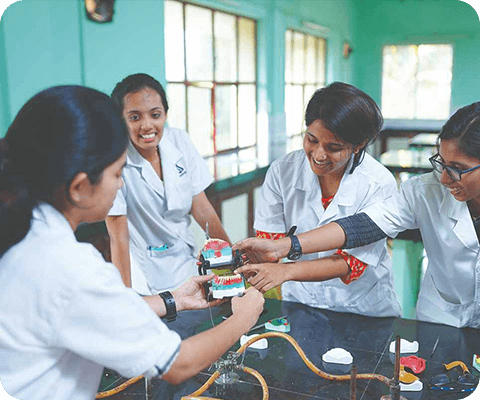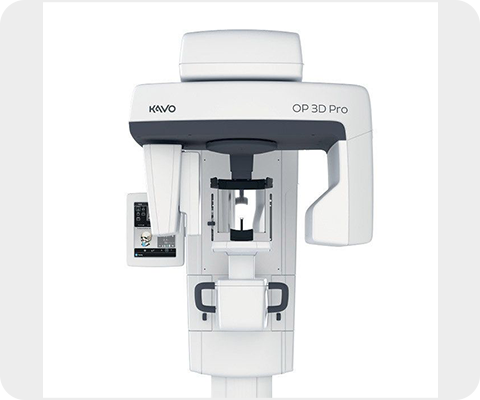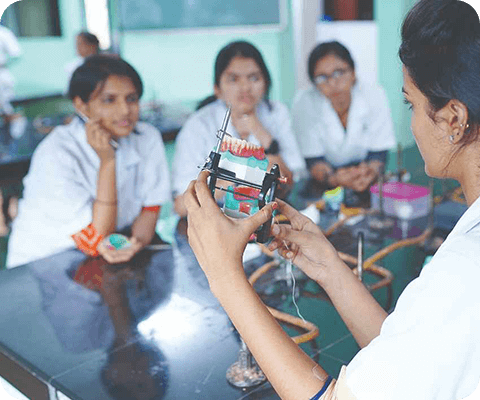The undergraduate course involves the organization of a year-wise teaching program. However, this course, as a whole, should demonstrate the integration of the basic sciences, clinical dentistry, and practical or laboratory skills. The course should be designed and integrated in such a way as to permit smooth progression from the pre-clinical to the clinical phase. Collaboration should be encouraged between teachers of basic sciences, dental sciences, and clinical subjects.
BDS


The undergraduate dental course consists of three main components. The first component consists of subjects common to modern medicine and dentistry like anatomy, physiology, biochemistry, and behavioral science, leading to pharmacology, pathology, microbiology, and then on to general medicine and general surgery. The second component runs concurrently with the first and deals with special aspects of oral and dental tissues, oral biology, and oral pathology. Finally, the third component based on the foundations of the first two deals with the clinical and technical aspects of dentistry as is required for a general dental practice.

The first component of the course is intended to provide initially, an appreciation of normal human structure, development, function, and behavior, leading to an understanding of diseases, their prevention, and treatment. The main objective is to provide students with a broad knowledge of normal structures and functions of the body, and the alterations that take place in disease with particular reference to those conditions in which medical and dental cooperation is essential for proper management. At this stage, the student should also be made aware of the social and psychological aspects of patient care with special reference to the relationship between dentist and patient. The behavioral sciences including both sociology and psychology should be introduced at the initial stages of the training program, much before the students deal with the patients.

The second component of the dental undergraduate program includes instruction in the subjects dealing with dental and oral aspects to ensure a detailed knowledge of the structure and function of the dental and oral tissues. This enables the student to diagnose, prevent, and treat dental and oral diseases and disorders, which were not included in the first component. The subject of oral biology is to be introduced at this level to provide the students with comprehensive knowledge and application of oral physiology, microbiology, biochemistry, and oral immunology. Students should be exposed to the basic aspects of forensic odontology at this stage of the course along with oral biology/oral pathology.

The third component of the course comprising the clinical and technical aspects of dentistry prepares the student to undertake total oral and dental health care for patients of all ages. The emphasis at this stage should be on the prevention of various dental diseases and how to preserve natural teeth with their supporting structures. The importance of various preventive methods needs to be stressed. The significance of the diagnosis of various dental and oral problems needs to be emphasized along with treatment planning before actual treatment procedures are undertaken. In addition to acquiring the knowledge, the students need to gain adequate clinical experience in extractions and other minor oral surgical procedures, all aspects of Conservative Dentistry, Endodontics, Crown and Bridge, provision of partial and complete dentures, various periodontal therapeutic procedures and use of removable orthodontic appliances. Familiarity with various radiological techniques, particularly intra-oral ends and proper interpretation of the radiographs, is an essential part of this component of training and has application in clinical diagnosis, forensic identification, and age estimation. Training in handling medico-legal cases including death certification should be imparted at this stage. Towards the final stage of the clinical training, each student should be involved in comprehensive oral health care or a holistic approach to enable him or her to plan and treat patients as a whole, instead of piece-meal treatment provided in each specialty. The aim of the undergraduate program should undoubtedly be to produce a graduate, competent in general dental practice.

The commitment towards society as a whole needs to be stressed along with the knowledge and treatment skills gained. Instruction in public health dentistry should emphasize the sociological aspects of health care and palliative care particularly; oral health care, including the reasons for variation in oral and dental needs of different sections of society. It is important to know the influence of social, behavioral, environmental, and economic factors on oral and dental health. Students should be made aware of the National Oral Health Policy and the importance of being a member of the Health care team delivering medical and oral health care, particularly among the rural population. Students should also be encouraged to participate in simple research project work.

The undergraduate curriculum stresses the significance of infection and cross-infection control in dental practice. Aspects like sources of infection, and measures to be adopted both general and specific for control, particularly HIV and hepatitis are incorporated in the curriculum so that the graduates are aware of its significance and follow it in their practice.

Information technology has touched every aspect of an individual’s personal and professional life. The University hence recommends that all undergraduates acquire minimum computer proficiency, which will enable them to enhance their professional knowledge and skills.
departments

Dental
- Periodontology and Implantology
- Prosthodontics And Dental Materials
- Conservative Dentistry & Endodontics
- Oral & Maxillofacial Surgery
- Orthodontics and Dentofacial Orthopaedics
- Pediatric and preventive dentistry
- Oral Medicine and Radiology
- Public Health Dentistry
- Oral pathology and Microbiology

general
- Departments , Major Equipments

medical
- Anatomy
- Physiology
- Anaesthesia
- Biochemistry
- Pharmacology
- Microbiology
- General Pathology
- General Medicine
- General Surgery

